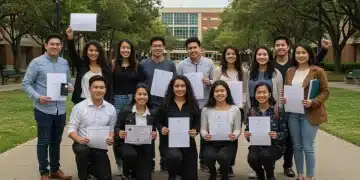Understand education grants USA and unlock funding options

Education grants in the USA provide financial aid for students based on need and merit, helping them cover tuition costs without the obligation to repay the funds.
Understanding education grants USA can be crucial for many seeking financial assistance for their studies. Have you ever considered how grants could ease your financial burden? In this article, discover various grants available and tips for securing them.
What are education grants in the USA?
Education grants in the USA are a vital financial resource for students. They are typically need-based awards that help cover educational costs, enabling many individuals to pursue their academic goals without incurring significant debt.
These grants can come from various sources, including federal, state, and private organizations. Understanding how they work is essential for anyone looking to fund their education.
Types of Education Grants
There are several types of education grants available. Most students are familiar with federal programs, such as:
- The Pell Grant
- The Federal Supplemental Educational Opportunity Grant (FSEOG)
- The Teacher Education Assistance for College and Higher Education (TEACH) Grant
- State-specific grants based on need or merit
Each of these grants has specific eligibility criteria and application processes. It’s important to research the requirements before applying.
How Grants are Funded
Education grants are funded through various channels. Federal government grants are often financed by taxpayer money, while state and local grants may come from specific education budgets. In addition, private organizations contribute funds for grants aimed at helping underrepresented students.
Applying for these grants typically involves filling out the Free Application for Federal Student Aid (FAFSA). This form helps determine your eligibility based on financial need, which is a key factor in securing education grants.
Remember, staying informed about different types of grants and how to apply can make a significant difference in your educational journey. Many students miss out simply due to a lack of knowledge or failure to meet the deadlines.
Types of education grants available
Understanding the different types of education grants available is crucial for students seeking financial aid. Each grant serves a unique purpose and has its own eligibility criteria. By knowing the options, you can find the best fit for your needs.
Federal Grants
Federal grants are funded by the government and are often based on financial need. One prominent example is the Pell Grant, which provides direct financial support to low-income undergraduate students. These grants do not need to be repaid, making them an attractive option for many.
- Pell Grant: For students with exceptional financial need.
- FSEOG: Federal Supplemental Educational Opportunity Grant is for students with exceptional need.
- TEACH Grant: For students who plan to teach in low-income schools.
Each of these grants has specific eligibility requirements and can significantly reduce the cost of education.
State Grants
In addition to federal assistance, many states offer their own education grants. These grants may target specific groups or areas of study. State grants often vary widely, so checking with your local education agency can be helpful. For instance, some states provide grants based on the student’s major or academic achievements.
Applying for state grants usually requires submitting an application separate from the FAFSA. Knowing your state’s offerings can provide you with additional funding opportunities.
Institutional Grants
Many colleges and universities also offer institutional grants, which are funded directly through their own resources. These can help bridge the gap between what students can afford and the actual costs of attending. Generally, the more competitive the institution, the more substantial the grant offerings.
Students often receive these grants based on merit, need, or both. Researching institutional grants at schools you are interested in can uncover valuable funding options.
Ultimately, understanding how to navigate the variety of types of education grants available can empower students to pursue their academic goals without accumulating substantial debt.
How to apply for education grants

Applying for education grants can seem daunting, but with the right steps, it becomes manageable. Knowing how to navigate the application process is key to securing financial aid for your education.
The first step is to fill out the Free Application for Federal Student Aid (FAFSA). This form is crucial as it helps determine your financial need and eligibility for various grants. Ensure you gather all necessary documents, such as tax returns and financial statements, before starting the application.
Understanding Deadlines
Each grant has specific deadlines, which can vary. It is important to keep track of these dates to ensure your application is submitted on time. Missing a deadline can disqualify you from receiving important funding.
- Check the federal deadlines for FAFSA submissions.
- Note state and institutional deadlines for additional grants.
- Organize your application tasks to stay ahead of due dates.
Creating a timeline will help you manage these deadlines effectively.
Researching Available Grants
Before applying, research the specific education grants available to you. Each grant may have unique eligibility requirements and application processes. Utilize resources like your school’s financial aid office or online databases to find options tailored to your situation.
Making use of these resources can increase your chances of receiving funding. Some grants cater to specific populations, such as minority students, veterans, or those pursuing certain fields of study. By identifying what grants you may qualify for, you can concentrate your efforts on those applications.
Lastly, be sure to double-check your application for accuracy and completeness. A well-prepared application increases your chances of success in securing education grants.
Common eligibility requirements
Understanding the common eligibility requirements for education grants is essential for students seeking financial assistance. These requirements can vary depending on the grant, but several key criteria apply to many funding options.
One of the most important factors is financial need. Most grants, especially federal ones like the Pell Grant, are awarded based on a student’s financial situation as determined by the FAFSA application.
Academic Performance
Many grants also consider a student’s academic performance. Maintaining certain GPA requirements can be critical for eligibility in continuing grant funding. Some grants even require students to demonstrate academic progress and completion of credits.
- Strong high school GPA or college GPA.
- Full-time enrollment status.
- Completion of a specified number of credits per year.
Being aware of these academic benchmarks helps students stay on track for receiving continued funding.
Enrollment Status
Your enrollment status is another vital factor. Most education grants require students to be enrolled at least half-time in a degree or certificate program. This means taking a minimum number of credit hours each semester. Programs that are not eligible might not support certain level courses or continuing education.
Additionally, some grants may target specific demographics. This includes grants for minority students, veterans, or those pursuing careers in high-demand fields, such as education or healthcare. Knowing the specific criteria can help students find appropriate funding opportunities that align with their backgrounds or aspirations.
Ultimately, understanding these common eligibility requirements is crucial for students wanting to maximize their chances of receiving education grants.
Tips for maximizing your grant opportunities
Maximizing your grant opportunities involves a few key strategies that every student should consider. Taking the time to prepare and research can significantly enhance your chances of securing funding.
One essential tip is to start early. Begin researching available grants as soon as possible, ideally a year before you plan to apply. This allows you to gather necessary documents and understand the specific eligibility requirements each grant demands.
Organize Your Applications
Staying organized is crucial in the application process. Keep a checklist of all required documents, deadlines, and application components. Creating a timeline can help ensure you stay on track and don’t miss any critical dates.
- List the grants you want to apply for.
- Note each grant’s specific requirements.
- Track your progress in completing applications.
This structure not only helps manage your time but also reduces stress as deadlines approach.
Customize Your Application
Next, tailor your applications to match each grant. Generic applications are often less successful. Read the grant description carefully and address how your academic goals align with the grant’s purpose.
Highlighting your unique experiences or challenges can also make your application stand out. Use your personal story to show how receiving the grant would impact your educational journey.
Furthermore, seek feedback. Before submitting your applications, ask teachers, advisors, or peers to review them. They can offer valuable insights and help catch any mistakes. Networking can also open doors to less-known grants, as other students or alumni may share their experiences and tips.
Finally, follow up on your applications. Knowing whether you’ve been awarded a grant or if additional information is needed can help keep you informed and prepared for the next steps in your educational funding journey.
By implementing these strategies, you can effectively improve your chances of securing education grants and achieving your academic goals.
FAQ – Frequently Asked Questions about Education Grants
What are education grants?
Education grants are financial awards that help students pay for their education. They do not require repayment, making them a valuable resource.
Who is eligible for education grants?
Eligibility for education grants often depends on financial need, academic performance, and enrollment status. Specific grants may have additional requirements.
How can I find education grants available to me?
You can find education grants through your school’s financial aid office, online databases, and state or federal resources that list available funding options.
What is the FAFSA and why is it important?
The FAFSA, or Free Application for Federal Student Aid, is a form used to determine your financial needs for education funding. It is essential for accessing federal grants and loans.





